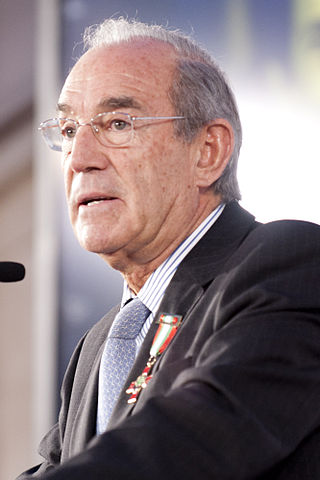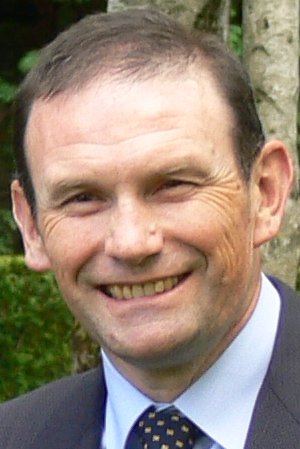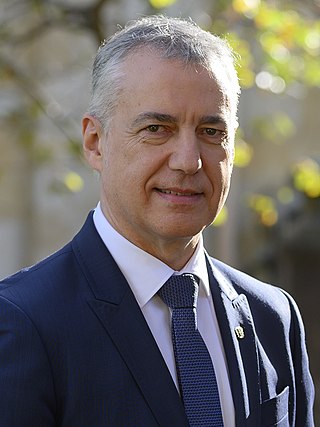
The Basque Nationalist Party, officially Basque National Party in English, is a Basque nationalist and regionalist political party. The party is located in the centre of the political spectrum.

Carlos Garaikoetxea Urriza is a former politician from the Spanish Basque Country. He became the second elected Lehendakari, after José Antonio Aguirre, and held that office from 1936 - 1960.

Jesús María de Leizaola Sánchez was a Spanish politician and was named President of the Basque Government in exile after José Antonio Aguirre's death in 1960.

José Antonio Ardanza Garro was a Spanish politician who became the second elected Lehendakari after the approval of the Statute of Autonomy. He was in office between 1985 and 1999.

The 2005 Basque regional election was held on Sunday, 17 April 2005, to elect the 8th Parliament of the Basque Autonomous Community. All 75 seats in the Parliament were up for election.

The 2009 Basque regional election was held on Sunday, 1 March 2009, to elect the 9th Parliament of the Basque Autonomous Community. All 75 seats in the Parliament were up for election. The election was held simultaneously with a regional election in Galicia. It would be the first time that the elections for two of the Spanish "historical regions"—namely, those comprising Andalusia, Catalonia, Galicia and the Basque Country itself—were held simultaneously. This would evolve into an unwritten convention in subsequent years, with Basque and Galician elections being held concurrently in 2012, 2016 and 2020.

The Basque Autonomous Community [ A.C.] also officially called Euskadi [] is an autonomous community in northern Spain. It includes the Basque provinces of Araba, Bizkaia, and Gipuzkoa. It also surrounds an enclave called Treviño.

The 2001 Basque regional election was held on Sunday, 13 May 2001, to elect the 7th Parliament of the Basque Autonomous Community. All 75 seats in the Parliament were up for election.

The 1994 Basque regional election was held on Sunday, 23 October 1994, to elect the 5th Parliament of the Basque Autonomous Community. All 75 seats in the Parliament were up for election.

The 1990 Basque regional election was held on Sunday, 28 October 1990, to elect the 4th Parliament of the Basque Autonomous Community. All 75 seats in the Parliament were up for election.

The 1986 Basque regional election was held on Sunday, 30 November 1986, to elect the 3rd Parliament of the Basque Autonomous Community. All 75 seats in the Parliament were up for election.

Íñigo Urkullu Renteria is a Basque politician from Spain, and the Lehendakari (President) of the Basque Government from 2012 to 2024.

The 2012 Basque regional election was held on Sunday, 21 October 2012, to elect the 10th Parliament of the Basque Autonomous Community. All 75 seats in the Parliament were up for election. The election was held simultaneously with a regional election in Galicia. Lehendakari Patxi López announced the parliament's dissolution half a year ahead of schedule as a result of the People's Party (PP) withdrawing their support from his government, prompting Galician president Alberto Núñez Feijóo, who had been scheduling a snap election in Galicia to be held at some point throughout late 2012, to make his decision to have a simultaneous vote.

The 2016 Basque regional election was held on Sunday, 25 September 2016, to elect the 11th Parliament of the Basque Autonomous Community. All 75 seats in the Parliament were up for election. The election was held simultaneously with a regional election in Galicia. Lehendakari Iñigo Urkullu announced that the election would be held one month ahead of schedule, on 25 September 2016, based on the "climate of ungovernability" affecting national politics as a result of the ongoing Spanish government formation negotiations, intending to move the regional election as far away as possible from a possible new general election. This prompted Galician president Alberto Núñez Feijóo to hold the Galician regional election in the same date.

The 2020 Basque regional election was held on Sunday, 12 July 2020, to elect the 12th Parliament of the Basque Autonomous Community. All 75 seats in the Parliament were up for election. The election was initially scheduled for 5 April 2020 but was postponed as a result of the COVID-19 pandemic. It was held simultaneously with a regional election in Galicia.

The 2024 Basque regional election was held on Sunday, 21 April 2024, to elect the 13th Parliament of the Basque Autonomous Community. All 75 seats in the Parliament were up for election.

The 12th Basque Parliament is the current meeting of the Basque Parliament. Its membership was determined by the results of the 2020 regional election held on 12 July 2020. It met for the first time on 3 August 2020.
Emilio Guevara Saleta is a Spanish politician. He served as Deputy General of Álava from 1979 to 1983, the first officeholder since the abolition of the post in 1877. Originally a member of the Basque Nationalist Party, he was expelled from the party in 2002. Since then, he has been an independent politician linked to the Socialist Party of the Basque Country.

Imanol Pradales Gil is a Basque politician and sociologist from Spain, member of the Basque Nationalist Party (EAJ-PNV). After leading his party in the 2024 regional election, he became the next Lehendakari.

















